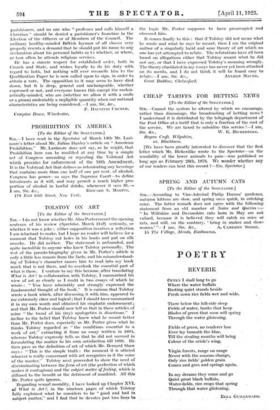TOLSTOY ON ART
[To the Editor of the SPECTATOR.] SIR,—I do not know whether Mr. Alan Porter meant the opening sentence of his review (Spectator, March 21gr) seriously, or whether it was a joke ; either supposition involves a reflection I am reluctant to make, but I hope no reader will believe for a moment that Tolstoy cut holes in his boots and put on silk smocks. - He did neither. The statement is unfounded, and quite .incredible to anyone who knew Tolstoy personally. The rest of the pseudo-biography given in Mr. Porter's article is only a little less remote from the facts, and his misunderstand- ing of Tolstoy's character causes him to read into my book much that is not there, and to overlook the essential part of -what is there. I venture to say this because, after translating What is Art ? in collaboration with Tolstoy, I summarized his view of art as clearly as I could in two essays of which Ile wrote : " You have admirably and strongly expressed the fundamental thought of the hook." It is curious that Tolstoy wrote a book which, after discussing it with him, appeared to me extremely clear and logical ; that I should have summarized it in my own words and obtained his emphatic endorsement ; and that Mr. Porter should now tell us that in those articles of mine. " the trend of his (my) apologetics is disastrous:" I incline to the belief that Tolstoy knew what he meant better than Mr. Porter does, especially as Mr. Porter gives what he thinks Tolstoy regarded as " the conditions essential to a work of art," extracting it from an essay written in 1894, whereas Tolstoy expressly tells us that he did not succeed in formulating the matter to his own satisfaction till 1898. He then gave us the definition of art of which Mr. Bernard Shaw says- : " This is the simple truth : the moment it is uttered whoever is really conversant with art recognizes in it the voice of the master." Tolstoy next proceeded to show the need of discriminating between the form of art (the perfection of which makes it contagious) and the subject matter of feeling, which is diffused to the benefit or the detriment of mankind. All this Mr. Porter quite ignores.
Regarding sexual morality, I have looked up Chapter XVI. a What is Art ?, in the nineteen pages of which Tolstoy fully explained what he considers to be " good and bad in subject matter," and I find that he devotes just two lines to
the topic Mr. Porter supposes to have preoccupied and obsessed him.
It comes finally to this : that if Tolstoy did not mean what he wrote and what he says he meant, then I am the original author of a singularly lucid and sane theory of art which no one has yet attempted to refute. The refutations have all been based on allegations either that Tolstoy meant what he did not say, or that 1 have expressed Tolstoy's meaning wrongly. The theory elucidated in my essays has never yet been attacked on its merits, and I do not think it will be found easy to










































 Previous page
Previous page